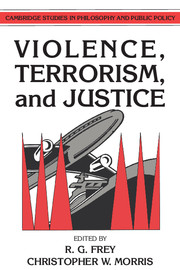Book contents
- Frontmatter
- Contents
- List of contributors
- Preface
- 1 Violence, terrorism, and justice
- 2 What purposes can “international terrorism” serve?
- 3 Violent demonstrations
- 4 Terrorism, rights, and political goals
- 5 The political significance of terrorism
- 6 Terrorism and morality
- 7 Which are the offers you can't refuse?
- 8 Making exceptions without abandoning the principle: or how a Kantian might think about terrorism
- 9 State and private; Red and White
- 10 State terrorism
- 11 Nuclear hostages
- 12 Rape as a terrorist institution
Preface
Published online by Cambridge University Press: 05 June 2012
- Frontmatter
- Contents
- List of contributors
- Preface
- 1 Violence, terrorism, and justice
- 2 What purposes can “international terrorism” serve?
- 3 Violent demonstrations
- 4 Terrorism, rights, and political goals
- 5 The political significance of terrorism
- 6 Terrorism and morality
- 7 Which are the offers you can't refuse?
- 8 Making exceptions without abandoning the principle: or how a Kantian might think about terrorism
- 9 State and private; Red and White
- 10 State terrorism
- 11 Nuclear hostages
- 12 Rape as a terrorist institution
Summary
The use of violence for social/political ends, whether by individuals, organized groups, or the state, is a troubling feature of contemporary life. On the one hand, we denounce it, even as we increasingly encounter it on all sides; on the other, we often find ourselves wanting to pick and choose rather more carefully the objects of our denunciation. Is the view we take of Middle Eastern kidnappings and bombings or the many killings perpetrated by the Irish Republican Army in Britain and Western Europe to be the same as that we take of Nelson Mandela and the African National Congress? What is to be our view when a group within a state, such as the Tamil Tigers in Sri Lanka, resorts to violence against the majority Sinhalese population, in the names of religious and political freedom? And what are we to make of Indian and Sinhalese attempts to crush the Tigers? More locally, how exactly are we to regard those who blow up abortion clinics? Are we to see them in the same light as those who break into animal laboratories? And what of those people who experience – and resist – rather violent police methods, including, after arrest, those employed in interrogation? The overwhelming temptation for many of us is to favor some causes as opposed to others and to do so on the ground that we think these causes just.
- Type
- Chapter
- Information
- Violence, Terrorism, and Justice , pp. xi - xiiPublisher: Cambridge University PressPrint publication year: 1991



